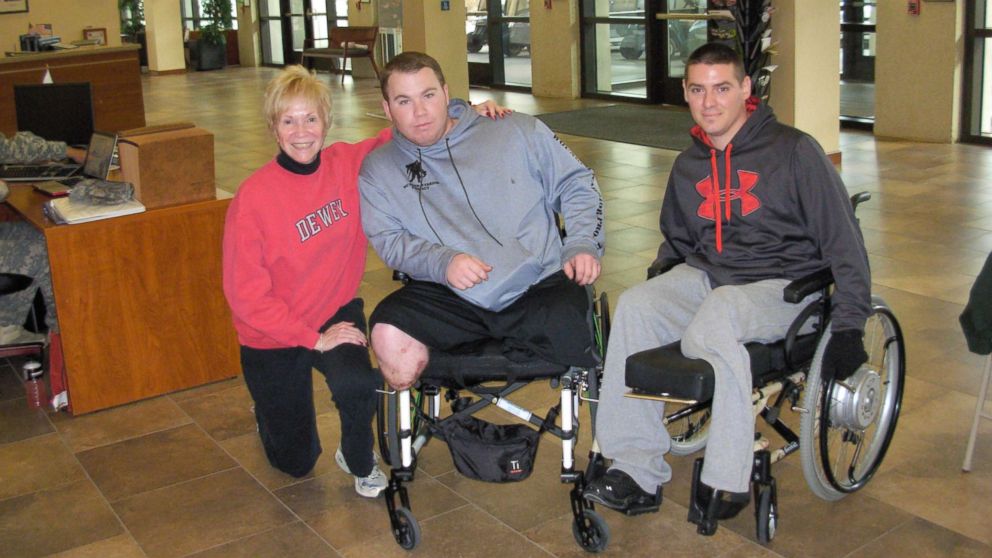Recovery fund helps veterans get back on track
All donations to the Combat Soldiers Recovery Fund go straight to soldiers.

— -- Garland Miller has spent her career crunching numbers.
Her successful bookkeeping company handles clients across Washington, D.C., including a woman who made custom clothes for disabled war veterans.
One day, Miller asked whether she could offer the veterans some extra cash to help them get back on their feet.
"I asked her, 'What if I start giving one person $500' -- and this was me individually -- and she said, 'No, give money to five people, $100.' And I go '$100? We throw away $100.' And she said, 'No, that means a lot to them.' So I started giving money personally. And I started getting these wonderful letters thanking me and [sharing] how it changed their life," Miller said.
Veterans take a knee in support of national anthem protestsHelping veterans and current service members heal through music
She said that one such letter had told her how the recipient had been able to bring their father up on a bus to visit them because they didn't have any money.
"So one day I was on a walk and [it] just came to me: I could start a foundation," Miller said.
So, she did and she called it the Combat Soldiers Recovery Fund. She got help from her lawyer, graphic artist and webmaster clients, who all provided their expertise and training free of charge.
The recovery fund uses none of its donations to run the charity, which Miller said was unheard of. Miller also said the donations had all come from word of mouth.
"From there, I said: 'Oh, I'll get $25,000.' And then I said, 'Oh, maybe I'll get $50,000.' And now it's grown that we've given out close to $900,000 to the wounded because we have no overhead," she said.
When Fleet Marine Force Corpsman Joey De Prisco returned home from war with a traumatic brain injury and very little money, his physical therapist told him about Miller's fund.
"She pulled out this little, nifty little card and she [his therapist] was like, 'Fill out this card and she'll send you a check. No questions asked,'" he said.
The father of twin sons in Annapolis, Maryland, said he got the check immediately.
"I was astonished," De Prisco said. "Every dollar literally went to baby supplies. We needed car seats. We needed everything."
More than 30,000 U.S. veterans returned home wounded in Iraq. Miller's fund wants to help all of them. It's an ambitious goal for a one-woman front office.
"We usually bring in between [$80,000] and $100,000 a year," she said. "My goal next year is to get to that million that we've given out to the wounded. Now that only covers maybe 3,500 wounded.
"There were 50,000 wounded in Iraq and Afghanistan and they're still getting wounded there," she added. "So I have a long way to go."
In Kansas City, Missouri, Sgt. Travis Stover received a $300 check when he reached his lowest point recovering from his war injuries.
"I just sort of lost all hope and was in a bad place," Stover said. "At the time, where I feel like I was kicked down in the trenches and nobody was there to help me out, there was a few people that gave their hand out and helped lift me out. ... The Combat Soldiers Recovery Fund was one of those organizations."
He said the few hundred dollars had made a difference in his life.
"Having your medical bills paid or whatever you spend that money on -- maybe enjoying a nice meal at McDonald's with your kids -- vets can't believe it," he said.
Miller said the foundation had changed her life.
"I realize I can't complain. All the people that I meet put me in a good mood," she said.
De Prisco now has a successful business that allows him to give back to the Combat Soldiers Recovery Fund. And, across the U.S., Stover has recovered and runs his own business.
"God bless her [Miller]. She donates all of her life and her time. I don't know where she gets all the energy because I don't even have that much energy," De Prisco said.
Miller said she hopes Americans check out Combat Soldiers Recovery Fund and consider donating.
"It is just a joy for me to do what I can do," she said.
This report is part of the three-hour ABC Radio special, "America Gives Thanks."



